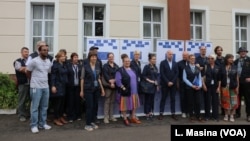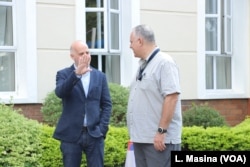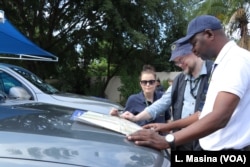The European Union has launched an observation mission for Malawi’s presidential elections next month. But some political analysts question the impact of foreign election observers will have on the poll.
The EU was the first to deploy observers for the county’s May 21 poll in response to an invitation issued by Malawi’s Electoral Commission and Foreign Ministry.
The EU observer mission’s deputy chief, Mark Stevens, spoke at the launch ceremony Thursday in Blantyre.
“Our hope is that the elections are transparent, inclusive, and credible and are run according to the code of conduct for the election and the laws for elections,” Stevens said.
The EU’s 28-member long-term observer team arrived in the country in early April.
EU observer team member Marketa Nekvindova is being deployed to central Malawi’s Lilongwe district.
“Will have a lot of interviews, with a lot of interlocutors, for example political parties, some NGOs, the electoral commissioners, also media. And then we will write our weekly report and sent it to our core team, and they will make analysis,” Nekvindova said.
The EU will send a second team of 32 short-term observers just before election day to monitor voting and counting operations.
Other foreign observer missions to Malawi’s elections will include Britain’s Commonwealth of Nations and the African Union’s.
Malawian political analyst Sheriff Kaisi says the observer missions should be coming earlier.
"To have free, fair and credible election is not only during campaign period. It’s a process whereby its starts from registration period, up to the day when election results are out. So, if they came much, much earlier than what they have done now, probably they might have an impact. But, for now, I don't think it will have an impact on our election," he said.
Kaisi said foreign observers all too often serve as a rubber stamp for African elections with doubtful outcomes.
“And the word that comes from the observers do not in many times satisfy the electorate because in many times when people are crying to say elections are not okay but still in many time[s] observers side with the winner,” Kaisi said.
The African Union has faced repeated criticism for recognizing the results of disputed election and those found rigged.
However, the EU observer mission says their mandate is not to decide if elections should be accepted or not but to ensure the quality of the process.
The EU mission observed Malawi’s elections in 2004, 2009 and 2014, when it recommended a biometric voting system after some polling center numbers did not match those registered.
A biometric system is being used for the first time in the Malawi’s May elections.
This year, seven presidential candidates are expected to contest the country's leadership.
The top contenders include incumbent President Peter Mutharika, who is seeking a second five-year term, Vice President Saulos Klaus Chilima, and the main opposition leader, Lazarus Chakwera.






